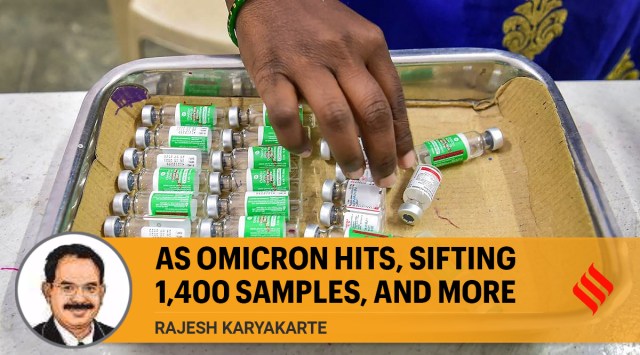- India
- International
As Omicron hits, sifting 1,400 samples, and more
🔴 Rajesh Karyakarte writes: To fully understand the spread and evolution of SARS-CoV2 virus and tackle its future spread, sequencing and analysing genomic data will be required.
 A health worker sorts empty vials during a vaccination drive, amid fears of the new Omicron variant, in Bengaluru. (PTI)
A health worker sorts empty vials during a vaccination drive, amid fears of the new Omicron variant, in Bengaluru. (PTI)As told to Anuradha Mascarenhas by Rajesh Karyakarte
When South Africa first detected the Omicron variant with whole genome sequencing, we decided to immediately coordinate the work of collecting and distributing 1,400 Covid samples that had tested positive in October and November to various INSACOG labs in Pune and rule out this variant of concern.
Under INSACOG or the Indian SARS CoV2 Genomics Consortium, the Viral Research and Diagnostic Laboratory (VRDL) at B J Government Medical College in Pune currently sequences samples that are clinically relevant, those of breakthrough infection, and in case there is a spike in infection in a particular area.
Till date, we have coordinated the sequencing of 21,371 samples and shared the data with relevant government authorities. Until now, the VRDL at BJGMC has tested 6,33,847 COVID-19 samples — 5,54,151 through RT-PCR tests and 80,933 through Rapid Antigen Tests. This tally is the highest for government laboratories in Maharashtra.
My mornings since the start of the pandemic are mostly spent in sharing latest scientific papers and developments with like-minded clinicians about RT-PCR tests and genome sequences.

To fully understand the spread and evolution of SARS-CoV2 virus and tackle its future spread, sequencing and analysing genomic data will be required. The study of accumulated mutations in the viral genomes will help us compare virus samples and lineages to understand if local outbreaks are caused by the transmission of single or multiple lineages. Analysis of SARS-CoV2 genome sequences is important to understand how the virus evolved and also further assess whether these mutations influence transmission, clinical outcomes, severity or if they may impact public health intervention measures and vaccines.
Genome sequencing was initiated at BJGMC, Pune, with the help of the National Centre for Cell Science, Pune, very early in the pandemic, with the signing of an MoU in June 2020. Then it was in the form of a scientific research study to find mutations in SARS-CoV-2 during April and May 2020. Our department was a part of the prestigious pan-India SARS-CoV-2 RNA Genome Sequencing Consortium formed under the aegis of Department of Biotechnology, Ministry of Science and Technology and Government of India through the NCCS, Pune.
We had carried out genome sequencing on samples from Amravati, Yavatmal and Satara, following the Covid-19 surge in February 2021. The 12 samples (four each from the districts) were sequenced by
Dr Athira Jayaram, Dr Sushma Yanamandra, Dr Smriti Shende, under the guidance of Genotypic Technologies Pvt Ltd, Bengaluru, and mutations analysed by Dr Rashmita Das and Dr Suvarna Joshi along with me. This study led to finding of the Kappa variant in samples tested from Amravati.
Our sequencing lab is now a partner in INSACOG and we undertook the important preliminary clinical study for comparing Delta variant to the AY.4 variant as requested by the INSACOG.
As the Laboratory Director for the Clinical Trials Unit (CTU) of Johns Hopkins University at BJGMC, I continue to pursue my passion for research. Overseeing test results is part of the work that I have to ensure as the microbiology laboratory cumulatively caters to over 1,500 samples daily, diagnosing bacterial and fungal infections using conventional and automated techniques, and viral infections like dengue, chikungunya, and hepatitis.
The journey started during the early stage of the pandemic, when the Indian Council of Medical Research’s (ICMR) National Institute of Virology (NIV) in Pune was engaged in Covid-19 testing using RT-PCR. The B J Government Medical College took the initiative to help the NIV by lessening its load in the humongous amount of testing anticipated in the Indian setting.
After the ICMR nod, tests were carried out in our Clinical Trial Unit and the HIV testing laboratory of the microbiology department — the only places which housed PCR machines. The first reporting was successfully carried out on March 23, 2020, that paved the way to the establishment of a full-fledged Viral Research and Diagnostic Laboratory (VRDL).
Eventually, the BSL-2 VRDL saw the addition of two automated RNA extractors and five new PCR machines. We then decided to start rapid antigen tests and CB-NAAT for Covid-19 in the casualty emergency ward itself, something that helped rapid segregation and admission of patients to either Covid-19 ICU/wards if tested positive or to the non-Covid ICU/wards if tested negative. This monumental task of testing more than six lakh samples for Covid-19, and coordinating the sequencing of over 20,000 samples, is a group effort carried out with the help and guidance of many other institutions.
Work does not stop at 7 pm and, at home, I am busy sending reports to government authorities on guidelines and protocols for Covid-19. This is apart from preparing quality teaching material for students of microbiology. My day ends after a new one has already begun at midnight.
Dr Karyakarte is Maharashtra coordinator for genome sequencing, HoD, Microbiology, at BJ Government Medical College and Sassoon Hospital, Pune
EXPRESS OPINION
More Explained
Apr 26: Latest News
- 01
- 02
- 03
- 04
- 05












































